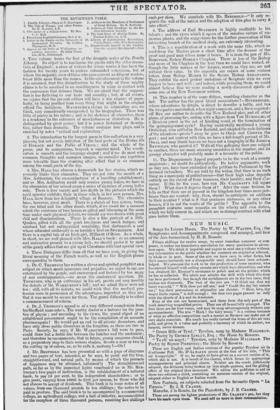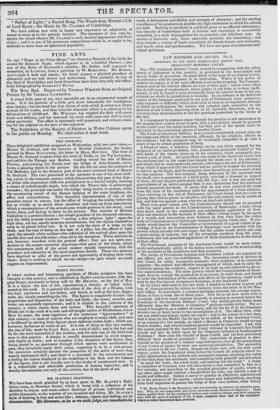NEW MUSIC.
Songs for Leisure Hours. The Poetry by W. WavroN, Esq. ; the Symphonies and Accompaniments composed and arranged, and four of the Airs harmonized, by H. R. BISHOP.
Fifteen shillings for twelve songs, by some nameless composer or corn posers, is rather too hazardous a speculation for many purchasers to adven- ture upon. We think it impolitic and unjust to send out a volume without any information to the public whether the contents are original or selected, in whole or in part. Some of the airs we have seen in other forms, but their source (certainly not a disreputable one) shottld have been acknow-
ledged. We presume the work to he the production of some amateur, who has amused himself with culling certain airs which have pleased him, and who has obtained Mr. BISHOP'S assistance to polish and set the pebbles which. he has so collected. We admit and admire the skill with which this duty has been performed ; but though the enrichments are in the best taste, they enclose not diamonds. The best of the airs are "0 think not that my heart was cold," " Wilt thou yet tell me," and " Could the day but restore me ;" but their pretensions to originality are slender. " Here, love, thy weary limbs repose," is dull enough : the first two pages present us only with the chords of A I, and its dominant.
Four of the airs are harmonized, and these form the only part of the work deserving unqualified praise. They are all beautifully arranged. The first three are for four voices, and may be sung advantageously without any accompaniment. The trio " Hark ! the fairy music" is a curious instance of what an effective composition such a master as BISHOP can make out of very slight materials. His touch has really turned the brass of this air into gold, and given it a value and probably a currency of which its author, we suspect, never dreamt.
"Green Hills of Tyrol ;" Tyrolien, sung by Madame MALIBRAN. The Poetry by GEORGE LINLEY, Esq. ; the Music by ROSSINI. " Tu ch' un angel ; " Tyrolien, sung by Madame MPLLIBRAN. The Poetry by Signoi-Pisesucci ; the Music by ROSSINI.
These are English and Italian versions of the popular Tyrolese air in Guillaume Tell. Mr. D'ALHAINE prints at the foot of his title, "This air is copyright." If so, he ought to have given us a correct version of it, which this is not. It is bereft of the chorus, which forms its appropriate accompaniment and principal charm. Neither are the words judiciously adapted, the divisions being broken up into single quavers, and the gliding effect of the original thus destroyed. We advise the publisher to add to these two editions a third, containing an accurate version of the original, adapted either to English or Italian words.
New Fantasia, on subjects selected from the favourite Opera "La Fiancée." By J. B. CRAMER. Mazurka, a la Rondo, for the Pianoforte, by J. B. CRAMER.
These are among the lighter productions of Mr. Csetetreies pen, but they have his mark. upon -them. We need add no more ia their commendation. "Father of Light ;" a Sacred Song. The Words from MOORE'S Life of Lord Byron ; the Music by Dr. CLARKE of Cambridge.
We have seldom met with so happy and expressive an adaptation of sound to sense as in the present instance. The character of this song be- speaks the school whence Dr. CLARKE'S early musical impressions had their origin ; and it is one of his numerous compositions which is, or ought to be, destined to more than an ephemeral popularity.



















 Previous page
Previous page